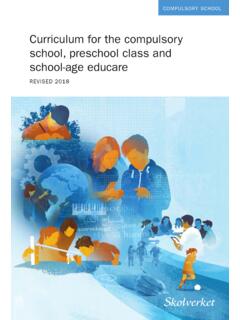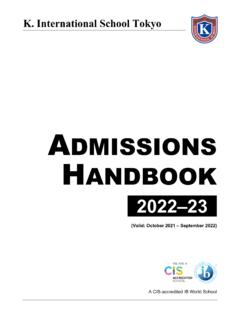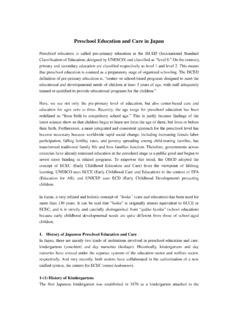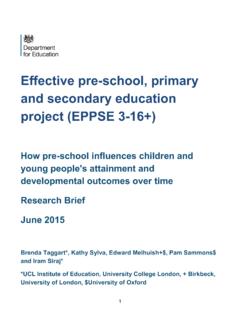Transcription of Early Childhood Education in Ireland: Change and Challenge
1 International Electronic Journal of Elementary Education , 2015, 8(2), 287-300. Early Childhood Education in Ireland: Change and Challenge Rosaleen MURPHY . University College Cork, Ireland Abstract Early Childhood care and Education in Ireland has come under increasing scrutiny in recent years, as a result of public concern about standards in some Early years services. Services for children before they enter primary school are largely the responsibility of the department of health, while children in the formal school system are the responsibility of the department of Education . This split is reflected in the pay, working conditions and qualifications of those working in each sector. Primary Education is state funded; pre- school care and Education has been seen as the responsibility of parents, and is among the most expensive in Europe.
2 Investment in Early years services is low and has been focused on expanding the number of places. There is now more co- ordination at government level and improved standards and frameworks for quality in Early Education (S olta) and for Early learning (Aistear) have been put in place. However, expanding services without paying equal attention to quality will not bring the desired benefits either to individual children or to society. Regulation and enforcement are important but are only one element of quality, and more attention needs to be paid to developing the Early years workforce and improving their working conditions. Keywords: Early Childhood Education , Quality, Ireland Introduction While the importance of Early Childhood care and Education (ECCE) has been widely acknowledged in policy documents in Ireland since at least the mid-1990s, it is only in recent years, and in response to public concern about the affordability of ECCE and the quality of some of what is on offer, that major initiatives have been taken to improve both.
3 In the last fifteen years, policies have been introduced and efforts have been made to increase the number of Early years places available, and to some extent, this had the desired effect. However, as the OECD (2012) points out, expanding services without paying equal attention to quality will not bring the desired benefits either to individual children or to society as a whole, and may indeed have detrimental effects on both. While initiatives to improve quality have also been launched, there is concern that these have not always had the desired effect. In part, this may be due to inadequate funding and support, Rosaleen Murphy, school of Education , University College Cork, Ireland, Phone: +353 21490. 2173 E-Mail: ISSN:1307-9298.
4 Copyright IEJEE. International Electronic Journal of Elementary Education , Issue 2, 287-300, 2015. as well as the historic fragmented nature of ECCE in Ireland. Much of the ECCE sector outside of the formal Education system was starting from a very low base in terms of staff qualifications and working conditions as well as the physical environment and facilities, all of which are important in attaining and maintaining a high quality environment for young children. Recent media reporting on non-compliance with standards in nurseries and cr ches have led to calls for tightening up of the current inspection regime, and a much closer scrutiny of the day-to-day operation of childcare services. While regulation and enforcement is important, it is only one element of quality, and on its own, is unlikely to lead to the kinds of improvements that it is desired to bring about.
5 The Childcare (Pre- school ) Regulations (1996, revised 2006) set out minimum standards for health and safety, and the introduction in 2006 of S olta, the national quality framework for Early Childhood Education , and in 2009 of Aistear, the national Early years curriculum framework for children from birth to six (NCCA, 2009), set out the standards that ECCE. services should meet. However, neither Aistear nor S olta is compulsory and the implementation of both has been slow. The introduction of the Free Pre- school Year (ECCE. Scheme) in 2010 was a landmark in Early Education , and for the first time meant almost universal access to at least one year of ECCE for all children. In the 2011/2012 school year, 67 000 or 94% of eligible children were enrolled in pre- school services under this scheme.
6 It transformed national social policy in relation to the provision of childcare as, for the first-time, the objective of the investment was the impact on children rather than the provision of places' (CEEU, 2014, ). The ECCE Scheme also offered a financial incentive to services to ensure that staff had a least a minimum qualification, and in this it has succeeded to some extent, though not perhaps as well as had been envisaged (CEEU, 2014). Within the formal school system, while the 1999 Primary school curriculum espouses a developmental approach to learning especially in the Early years, the 2004 OECD review found that an overly didactic approach prevailed in the majority of classrooms catering for four to six year olds.
7 Among the reasons that have been put forward to explain this are large class sizes, lack of space and facilities and an over-dependence on workbooks (Nic Craith & Fay, 2007). Regrettably therefore, it cannot be said that Early years provision, either within the formal school system or outside it, has reached the kind of standards that all of us would wish for our children, and without a concerted effort at national level, this is unlikely to Change . This paper will first consider how national policy has both influenced and constrained the development and accessibility of ECCE in Ireland, and second, it will discuss the issue of quality in ECCE, using as a framework the five policy levers for quality identified by the OECD (2012): (i) quality goals and regulations; (ii) curriculum standards; ( iii) improving qualifications, training and working conditions; (iv) engaging families and community and (v) advancing data collection, research and monitoring.
8 This paper will look at the Irish Early years sector in relation to each of these headings, but will focus mainly on the first three, as these have been to the forefront of current discussion and debate. Reports appear in print and on-line regularly also of families describing the cost of childcare as excessively burdensome, while workers in pre-schools and nurseries campaign against low pay and poor working conditions. There are reports of non-compliance with standards in nurseries and cr ches, and of cr che owners being fined for breaches of the Child Care Regulations. The overall impression is of a problematic system of care and Education for children in the Early years, but how valid is this impression, and how can it be remedied?
9 288. Early Childhood Education in Ireland / Murphy Early years Education and care in Ireland: The background Historically, the responsibility at government level for Early Childhood care and Education in Ireland, as in many other countries, has been split between the departments of Education and health. Children in the primary school system (ages 4 to 12) are the responsibility of the Department of Education and Skills. While compulsory attendance at school begins at age 6, in practice around 40% of four year olds and almost all 5 year olds are already attending school . Children may begin attending school in the September of each year, and in the past almost all of those who had reached the age of four did so.
10 A. trend has been noted in recent years for a slightly older starting age, with many children waiting until they are 5 to start school , but this effect is less noticeable in families from a lower income bracket. The Growing Up in Ireland study (a major longitudinal study of Irish children) found that children from more advantaged families were more likely to defer starting school , with only 23% of children from the highest income quintile born in June 2008 starting school in September 2012, compared to 52% of those born in the same month from the lowest quintile (McGinnity, Murray & McNally, 2013, p. 1). It is possible that for lower income families the longer school day (four and a half hours, compared to three hours in pre- school ) may be more attractive, as it might allow a parent to return to work part-time without having to pay for childcare.













